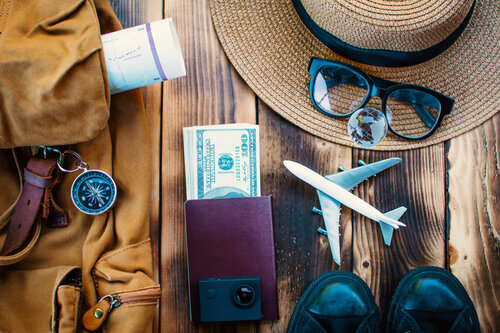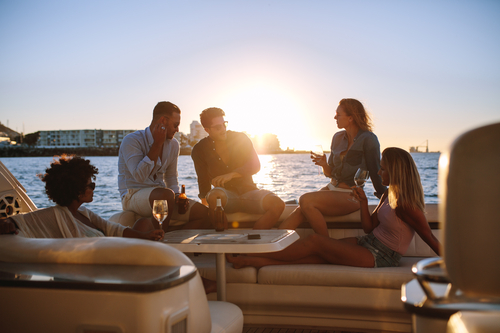
Do Americans see travel as a worthwhile investment even in the face of a recession? Many say yes—even viewing travel as essential spending. Meanwhile, American travelers seem to be experienced with considering and adjusting for natural disasters when it comes to travel planning.
IMPORTANT: These findings are brought to you from our independent research, which is not sponsored, conducted or influenced by any advertising or marketing agency. The key findings presented below represent data from over 4,000 American travelers collected in September 2022.
Navigating natural disasters: Our thoughts are with all impacted by Hurricanes Ian and Fiona. Coincidentally, questions about navigating natural disasters were planned for this latest The State of the American Traveler survey, which was fielded September 15-25th. The survey found that American travelers appear to be experienced with considering and adjusting for natural disasters. Just over one-in-ten (11%) of American travelers say that natural events, hazards or disasters have impacted their travel in some way in the past year alone, with the most common being wildfires (30.4%), heatwaves (28.3%), floods (26.0%) and winter storms (25.4%). Among the 11% who have been impacted more recently, natural events/disasters have most commonly caused these travelers to change the timing of their trip (37.2%), but another 21.6% have also avoided specific destinations and/or cancelled a planned trip (17.7%). When asked which type of natural event/disaster has caused them to cancel trips outright or avoid destinations, wildfires were by far the most common in both situations, followed by flooding. Unsurprisingly, when asked what prompts Americans to think about natural events/disasters when planning travel, the majority (54.9%) cite news stories. Interestingly though, Baby Boomers (63.6%) were much more likely than younger travelers to be prompted by news stories, whereas Millennials and Gen Z are also significantly prompted by posts on social media (31.8% and 40.5%, respectively vs. 9.5% for Baby Boomers).
While Americans see an economic recession looming, many still view travel as “essential” and remain committed to spending on travel even in an economic downturn. Nearly two-thirds (63.6%) of American travelers expect the U.S. to enter an economic recession sometime this year and because of this 65.7% say they are being careful with their money. This is likely contributing to the declining sentiment that now is a good time to spend on travel (currently at 26.4%, down 4 points from the start of summer). Still, 60.8% say they generally consider travel to be a worthwhile investment. Interestingly, an even larger proportion (74.8%) agreed that they still consider travel to be a worthwhile investment during a recession. In addition, 39.3% consider spending money on travel right now to be essential—a sentiment that is strongest amongst Millennials, those who reside in the south and parents of school-aged children. Those in higher income groups (i.e., who have a household income of $100k or more) are also more likely to feel that travel spending is essential in the current environment. American travelers who identify as Black/African Americans (47.8%) and/or as Asian (42.6%) are also likelier to feel travel is essential.
Late Fall/early Winter trip expectations are holding strong—with visiting friends/family, vibe/atmosphere, and food/cuisine driving aspiration. Over a quarter of Americans anticipate taking a trip in either October (26.6%), November (24.8%) and/or December (28.4%). This is notable growth from June, when only approximately one-in-five said they had trip expectations for the fourth quarter of 2022. As expected as we enter the holiday season, visiting friends/family is the top driver of near-term destination aspiration. However, this is followed closely by the desire to return to a destination, general atmosphere and food & cuisine. Interestingly, for Millennials and Gen Z, adventure and food are more significant drivers of aspiration, whereas Gen X and Baby Boomers are likelier to cite wanting to return to a previously visited destination and beaches. As for parents of school-aged children, while their top drivers are also visiting a place before and wanting to return, visiting friends/family and food/cuisine, they are more likely than the average to also cite beaches/water sports (25.4%), adventure (22.9%), theme parks (20.1%) and shopping (19.4%).
Additionally, Americans continue to prioritize having fun and relaxation when traveling, but as destination marketers know, relaxation can mean a myriad of different things to different travelers. To dig deeper into travelers’ personal definitions of relaxation they were asked to define exactly what they consider relaxing while traveling. The majority cited being in a quiet/peaceful location (82.5%) followed by beach time (69.7%), chilling-out poolside (67.3%), enjoying culinary experiences (65.6%) and luxury hotel experiences (60.4%). Interestingly, Gen Z was much more likely than other generations to consider shopping to be relaxing (52.7% vs. 36.9% for the average traveler) and Millennials were more likely to consider being physically active as a form of relaxation when traveling (44.8% vs. 38.2% for the average).
Don’t forget to register for our upcoming webinar.



